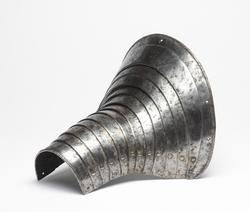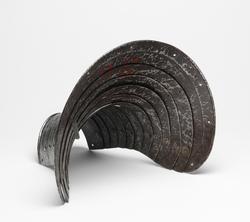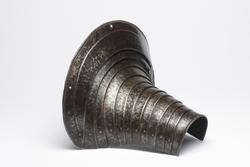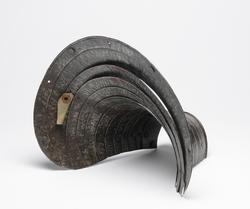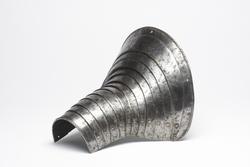Current Location: In storage
Maker(s)
Production:
Unknown
Entities
Categories
Description
Defence for the left foreleg of a horse, for heavy cavalry use, forming a pair or near pair to M.14-1947. Formed of twelve downward-overlapping lames curved to the front of the horse's upper foreleg and shoulder, and increasing in width to its upper end. The upper edge of the top lame is slightly convex with gently rounded corners. It has a file-roped inward turn accompanied by a recessed border containing nine holes for lining-rivets, of which six are occupied by externally-flush rivets. The lower edge of the bottom lame also has a file-roped inward turn. The outer ends of the lame on each are fitted with externally-flush rivets that formerly served to secure a strap around the rear of the horse's leg. The first to eleventh lames have bevelled outer edges. The lames are connected to one another at their outer ends by externally-flush sliding-rivets. The lames were further connected to one another by a pair of internal leathers located a short distance within the sliding-rivets. The leathers were attached to each lame by single externally-flush rivets. The rivets for the outer leather are preserved in the ninth to twelfth lames, and for the inner leather, in the eighth and ninth lames.
Notes
History note: From the armoury of the Princes Radziwill, Castle of Niescwiez, Poland. To save the armoury from the Bolshevist uprising, the Lithuanian family of Radziwill moved it to their town-house in Warsaw. According to the London dealers Fenton and Furmage, the collection was acquired by the Austrian Dealers Pollak and Windonitz just before the First World War. Some pieces were sold in Germany, but most were offered for sale at Christie's, London, on 29 June 1926 and 14 June 1927 as the armoury of a `Russian Prince'.
Legal notes
Given by F.H. Cripps-Day
Measurements and weight
Depth: 22.1 cm
Height: 25.5 cm
Weight: 1.02 kg
Width: 29.1 cm
Acquisition and important dates
Method of acquisition: Given
(1945-10-16)
by
Cripps-Day, Francis Henry
Dating
15th Century, Mid
Production date:
circa
AD 1550
Note
Similar leg-defences for a horse are depicted in Hans Burkmeier's Triumph of Maximilian.
The leg-defence has a ' black from the hammer' finish, now much worn, particularly at the centre of its lower half.
Components of the work
Border
Decoration
Parts
Materials used in production
Steel
Techniques used in production
Hammered
: Formed of twelve downward-overlapping lames curved to the front of the horse's upper foreleg and shoulder, and increasing in width to its upper end; hammered, shaped, riveted, with file-roped, recessed border and bevelled decoration
Patinating
Formed
Inscription or legends present
Inscription present: large
- Text: 37
- Location: Internally
- Method of creation: Painted in red
- Type: Number
Inscription present: parchment tag
- Text: CRIPPS-DAY/112/Horse leg piece
- Method of creation: Inscribed
- Type: Tag
Identification numbers
Accession number: M.9-1945
Primary reference Number: 18663
Stable URI
Audit data
Created: Saturday 6 August 2011
Updated: Monday 29 April 2024
Last processed: Tuesday 13 May 2025
Associated departments & institutions
Owner or interested party:
The Fitzwilliam Museum
Associated department:
Applied Arts
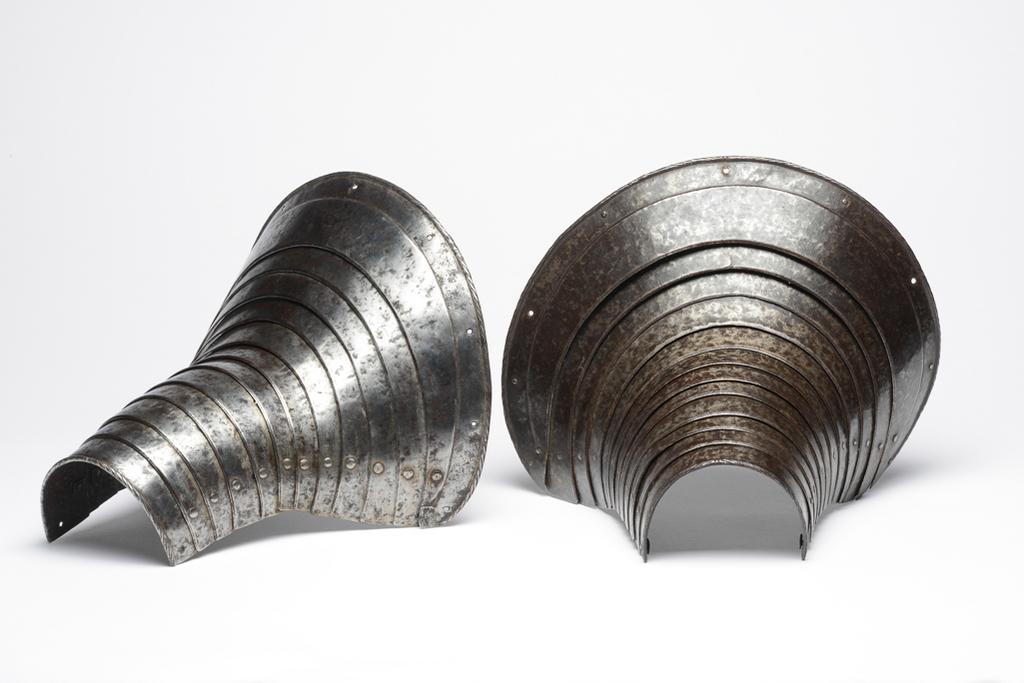
 IIIF Manifest
IIIF Manifest
